Lori Hatcher's Blog: Refresh Blog, page 35
August 25, 2019
4 Things to Remember If Your Loved One Still Isn't Saved
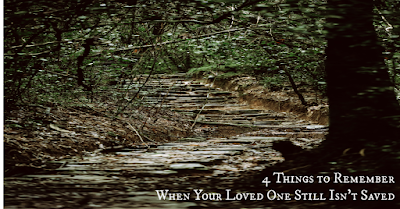 You’ve been praying for your friend or loved one for years. Maybe decades. But they seem no closer to Jesus than the day you uttered your first prayer.
You’ve been praying for your friend or loved one for years. Maybe decades. But they seem no closer to Jesus than the day you uttered your first prayer. In some ways, they seem more lost than ever, reaping the consequences of their poor choices and struggling against the undertow of their sin. Or worse—they’re enjoying the fruit of prosperity, oblivious to their need for a Savior.
 I know that weary road. The one you walk every day wishing, hoping, and praying that your loved one will come to faith in Jesus. You see them traveling the path of destruction, or perhaps disinterest, and you yearn for so much more for them. Peace. Health. Purity. Love.
I know that weary road. The one you walk every day wishing, hoping, and praying that your loved one will come to faith in Jesus. You see them traveling the path of destruction, or perhaps disinterest, and you yearn for so much more for them. Peace. Health. Purity. Love. Some days you grow discouraged and disheartened, wondering if your prayers are accomplishing anything. God’s going to save who God’s going to save, you think, so why bother praying, and crying, and hoping?
God is going to save who God’s going to save, and this truth gives me great hope. It assures me that God will do everything in his unfailing power without violating my loved one’s free will to draw them to himself. But he will use my prayers to help bring that transformation about.
Our prayers aren’t useless, otherwise he wouldn’t tell us to pray. But sometimes we grow weary. If you are one of the weary ones, committed to pray but struggling against doubt and discouragement, here are
Four things to remember when your loved one still isn’t saved:
1. You can pray in confidence.
While not everyone will come to faith in Christ, God’s invitation is open to everyone. You can pray in confidence, knowing that you're praying in agreement with God's will. His heart desires everyone to come to repentance, and he’ll do everything possible to draw them to himself. “The Lord is not slow in keeping his promise, as some understand slowness. Instead he is patient with you, not wanting anyone to perish, but everyone to come to repentance” (2 Peter 3:9).
 2. No heart is too hard for God. “Here is a trustworthy saying that deserves full acceptance: Christ Jesus came into the world to save sinners—of whom I am the worst” (1 Peter 1:15). The apostle blasphemed the name of Christ. He hunted down and murdered untold number of Christians. and did everything within his power to wipe Christianity from the face of the earth.
2. No heart is too hard for God. “Here is a trustworthy saying that deserves full acceptance: Christ Jesus came into the world to save sinners—of whom I am the worst” (1 Peter 1:15). The apostle blasphemed the name of Christ. He hunted down and murdered untold number of Christians. and did everything within his power to wipe Christianity from the face of the earth. By his own testimony, he was the baddest of the bad. Yet God saved him. No matter what our loved ones have done or how hard they seem, God can still remove their stony hearts and give them hearts of flesh (Ezekiel 11:19).
3. If your prayers reach beyond your lifetime. Even if your prayers go unanswered in this lifetime, they can still extend into the future. Even if you're no longer alive, your prayers will continue to work on your loved one’s behalf. Heroes of the faith like Moses, Solomon, and Daniel often prayed for future generations, asking God to draw them to himself.
Based on Deuteronomy 7:9, my husband and I often pray that God will extend his saving grace to a thousand generations of our family.
"Know therefore that the Lord your God is God; he is the faithful God, keeping his covenant of love to a thousand generations of those who love him and keep his commandments."
We pray for our grandchildren's salvation, for their future spouses' salvation, and for salvation for the generations yet to come, through time until Jesus comes back.
4. Even if you aren’t nearby, God's people are everywhere. A beautiful example of this happened at Paul’s conversion. First, God spoke to Paul apart from the influence of a sermon, preacher, or Christian witness. Then, after Paul received faith, he sent Ananias, a believer, to explain the next steps and to baptize him.
Oftentimes, if we’re the only Christian in our family or circle of influence, we think it’s all up to us. If we don’t witness to our loved ones, then no one else will. While we should use every opportunity God gives us to share our faith with those closest to us, we might live far away or they might resist our efforts. Maybe the opportunity for spiritual conversations are rare or limited.
While God often uses a believing family member or friend to lead someone to Christ, He isn’t limited by time, distance, or manpower. God has the world’s resources at his disposal and can use anything and anyone. When you pray for your lost loved ones, don’t forget to ask God to bring bold, winsome, and dynamic believers into their lives.
God saves those he’s going to save, and, by God’s mercy and grace, we get to be a part of His work. He invites us, through the soul sweat of prayer, to come alongside him as he draws our loved ones to Himself. As theologian and author C. S. Lewis wrote in his book, Miracles ,
“The event [in question] has already been decided—in a sense it was decided “before all worlds.” But one of the things taken into account in deciding it, and therefore one of the things that really cause it to happen, may be this very prayer that we are now offering. . . .”
Pray on, dear heart. “Let us not become weary in doing good, for at the proper time we will reap a harvest if we do not give up” (Galatians 6:9).
Who are you praying for? If you'll leave their first name in the comment box, I'll join you in prayer for their salvation.
 Are you hungry for God, but starving for time?
Are you hungry for God, but starving for time? I’d love to send you a 5-minute e-mail devotion twice a week to start your day off with the Lord.
Sign up for a free subscription to Hungry for God by CLICKING HERE.
Then, be sure to VALIDATE the confirmation email you receive.
Note: I promise never to spam you or share your email address.
Because busy women need to connect with God in the craziness of everyday life.

If this post was meaningful to you, would you consider sharing it with a friend by clicking on one of the buttons below? Did you know you can receive bi-weekly Hungry for God posts sent directly to your email inbox? Visit http://www.lori-benotweary.blogspot.com and click on the link in the right hand corner to Subscribe Via Email.
Copyright 2018 by Lori Hatcher
Published on August 25, 2019 17:59
August 21, 2019
Grandparents Unite in Prayer on Grandparents Day - A Guest Post
Today I'd like to welcome Lillian Penner, an avid grandparent and Co-Prayer Coordinator for Christian Grandparenting Network. She has a valuable message for those of us who have children or grandchildren. Would you give her a warm Hungry for God welcome by leaving a comment below?
Grandparents’ Day was designated by a Senate proclamation signed by President Jimmy Carter in 1978 to be observed the second Sunday in September.
 The mission of Christian Grandparenting Network is to promote effective grandparenting, with the aim of helping our grandchildren know and follow Christ wholeheartedly.
The mission of Christian Grandparenting Network is to promote effective grandparenting, with the aim of helping our grandchildren know and follow Christ wholeheartedly.
This is why Christian Grandparenting Network is asking grandparents all over the world to join in prayer for their grandchildren and the parents of their grandchildren on, Sunday, September 8, making it a Grandparents’ Day of Prayer.
It's a global reality that truth is under attack like never before in our schools, our political arenas, the marketplace, and even in our churches. Christianity is under assault, and parents and grandparents find themselves involved in a tug of war for the hearts and minds of their children.
 It's not easy for our grandchildren to navigate in a world hostile to truth in this post-Christian culture. Satan is relentless in his aggressive attack to desensitize our children to truth and righteousness. The enemy wants to disintegrate and divide our families, rendering them chaotic, restless, and unfruitful.
It's not easy for our grandchildren to navigate in a world hostile to truth in this post-Christian culture. Satan is relentless in his aggressive attack to desensitize our children to truth and righteousness. The enemy wants to disintegrate and divide our families, rendering them chaotic, restless, and unfruitful.
Let’s not let the enemies distract us or dull our desires to pray for our grandchildren and their parents intentionally. We're in a spiritual battle requiring spiritual weapons. Prayer is our best weapon to defeat the enemy.
I believe it’s our place as grandparents to get on our knees, humble ourselves, seek God’s face, repent of our sin, and intercede for our nations, our children, and grandchildren. Then having done all, we stand firm in our faith that God has heard and will answer our prayers according to His will. "Do not be afraid or discouraged . . . . For the battle is not yours but Gods." II Chronicles 20:15
Our grandchildren and their parents not only need our support, they also need our earnest prayers. They need our united prayer, a good, unified prayer for our hope and dreams for the next generation to be realized.
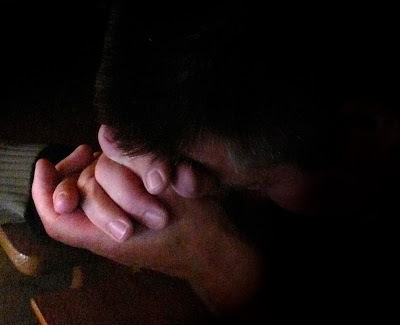 Jesus declared, “Again I say to you, that if two believers on earth agree [that is, are of one mind, in harmony] about anything that they ask [within the will of God], it will be done for them by My Father in heaven. For where two or three are gathered in My name [meeting as My followers], I am there among them” (Matt. 18:19-20).
Jesus declared, “Again I say to you, that if two believers on earth agree [that is, are of one mind, in harmony] about anything that they ask [within the will of God], it will be done for them by My Father in heaven. For where two or three are gathered in My name [meeting as My followers], I am there among them” (Matt. 18:19-20).
We believe praying grandparents can win the battle for the hearts and minds of our precious grandchildren and their parents. Many years ago, when the Israelites’ lives were threatened physically, Esther stood in the gap for her people. Today, grandparents can stand in the gap for their grandchildren and their parents as their spiritual lives are threatened.
Over the last eight years, many grandparents throughout the world have been uniting in prayer on Grandparents’ Day of Prayer. Christian Grandparenting Network would like to invite all praying grandparents to join us again to come before God’s throne of grace, to obtain mercy and find grace in our time of need for our grandchildren and their parents.
Our grandchildren are back in school so lets make September a month of intentional prayer for our grandchildren, their teachers, and other adult influences, as well as throughout the year. In the past, united prayer has always bridged the gap between a great need and a great awakening!
We hope thousands of churches and groups around the world will participate in this intentional day of prayer on behalf of the next generation. You could hold an event in your church, in your home, in a retirement complex, or any meeting location of your choice.You may want to host a prayer breakfast or a luncheon following your morning worship. Or you may want to offer an afternoon tea or evening dessert in your home.
Perhaps your minister is willing to address the importance of praying grandparents and set aside a particular prayer time during the worship service. The possibilities are endless. It is imperative; no matter the format, that grandparents gather to pray for their grandchildren.
CGN is happy to provide step-by-step guidelines, resources, and online tools to help you create a successful event that will engage grandparents in prayer.
The Christian Grandparents Network recognizes the desperate moral and spiritual climate our grandchildren and their parents face today. Our grandchildren face an aggressive attack in media, education, and social influence that is meant to desensitize and destroy their faith in Christ.
I'm a parent of five children and know the urgency of grandparents praying for my children. I highly recommend you participate in the Grandparents’ Day of Prayer. We're looking for grandparents who believe in the power of prayer to participate in this event.
Will you help us call grandparents to join in prayer on September 9th?
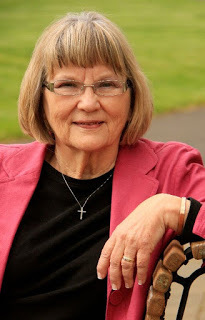 To learn more and indicate participation in the movement, or organize a time of prayer for grandparents go to our website HERE You'll see endorsements, testimonials, promotional materials, and free downloads.
To learn more and indicate participation in the movement, or organize a time of prayer for grandparents go to our website HERE You'll see endorsements, testimonials, promotional materials, and free downloads.
For additional information, contact Grandparents’ Day of Prayer Coordinator Lillian Penner, at lpenner@christiangrandparenting.net.
Lillian Penner is the author of Grandparenting with a Purpose: Effective Ways to Pray for Your Grandchildren and is Co-Prayer Coordinator for Christian Grandparenting Network. An avid blogger, Lillian will break into smiles if you ask about her twelve grandchildren and four great-granddaughters. She and her husband, John, live in Portland, Oregon, where they are active in church ministries.
 Are you hungry for God, but starving for time?
Are you hungry for God, but starving for time?
I’d love to send you a 5-minute e-mail devotion twice a week to start your day off with the Lord.
Sign up for a free subscription to Hungry for God by CLICKING HERE.
Then, be sure to VALIDATE the confirmation email you receive.
Note: I promise never to spam you or share your email address.
Because busy women need to connect with God in the craziness of everyday life.
If this post was meaningful to you, would you consider sharing it with a friend by clicking on one of the buttons below? Did you know you can receive bi-weekly Hungry for God posts sent directly to your email inbox? Visit http://www.lori-benotweary.blogspot.com and click on the link in the right hand corner to Subscribe Via Email.
Copyright 2018 by Lori Hatcher
Grandparents’ Day was designated by a Senate proclamation signed by President Jimmy Carter in 1978 to be observed the second Sunday in September.
 The mission of Christian Grandparenting Network is to promote effective grandparenting, with the aim of helping our grandchildren know and follow Christ wholeheartedly.
The mission of Christian Grandparenting Network is to promote effective grandparenting, with the aim of helping our grandchildren know and follow Christ wholeheartedly. This is why Christian Grandparenting Network is asking grandparents all over the world to join in prayer for their grandchildren and the parents of their grandchildren on, Sunday, September 8, making it a Grandparents’ Day of Prayer.
It's a global reality that truth is under attack like never before in our schools, our political arenas, the marketplace, and even in our churches. Christianity is under assault, and parents and grandparents find themselves involved in a tug of war for the hearts and minds of their children.
 It's not easy for our grandchildren to navigate in a world hostile to truth in this post-Christian culture. Satan is relentless in his aggressive attack to desensitize our children to truth and righteousness. The enemy wants to disintegrate and divide our families, rendering them chaotic, restless, and unfruitful.
It's not easy for our grandchildren to navigate in a world hostile to truth in this post-Christian culture. Satan is relentless in his aggressive attack to desensitize our children to truth and righteousness. The enemy wants to disintegrate and divide our families, rendering them chaotic, restless, and unfruitful. Let’s not let the enemies distract us or dull our desires to pray for our grandchildren and their parents intentionally. We're in a spiritual battle requiring spiritual weapons. Prayer is our best weapon to defeat the enemy.
I believe it’s our place as grandparents to get on our knees, humble ourselves, seek God’s face, repent of our sin, and intercede for our nations, our children, and grandchildren. Then having done all, we stand firm in our faith that God has heard and will answer our prayers according to His will. "Do not be afraid or discouraged . . . . For the battle is not yours but Gods." II Chronicles 20:15
Our grandchildren and their parents not only need our support, they also need our earnest prayers. They need our united prayer, a good, unified prayer for our hope and dreams for the next generation to be realized.
 Jesus declared, “Again I say to you, that if two believers on earth agree [that is, are of one mind, in harmony] about anything that they ask [within the will of God], it will be done for them by My Father in heaven. For where two or three are gathered in My name [meeting as My followers], I am there among them” (Matt. 18:19-20).
Jesus declared, “Again I say to you, that if two believers on earth agree [that is, are of one mind, in harmony] about anything that they ask [within the will of God], it will be done for them by My Father in heaven. For where two or three are gathered in My name [meeting as My followers], I am there among them” (Matt. 18:19-20). We believe praying grandparents can win the battle for the hearts and minds of our precious grandchildren and their parents. Many years ago, when the Israelites’ lives were threatened physically, Esther stood in the gap for her people. Today, grandparents can stand in the gap for their grandchildren and their parents as their spiritual lives are threatened.
Over the last eight years, many grandparents throughout the world have been uniting in prayer on Grandparents’ Day of Prayer. Christian Grandparenting Network would like to invite all praying grandparents to join us again to come before God’s throne of grace, to obtain mercy and find grace in our time of need for our grandchildren and their parents.
Our grandchildren are back in school so lets make September a month of intentional prayer for our grandchildren, their teachers, and other adult influences, as well as throughout the year. In the past, united prayer has always bridged the gap between a great need and a great awakening!
We hope thousands of churches and groups around the world will participate in this intentional day of prayer on behalf of the next generation. You could hold an event in your church, in your home, in a retirement complex, or any meeting location of your choice.You may want to host a prayer breakfast or a luncheon following your morning worship. Or you may want to offer an afternoon tea or evening dessert in your home.
Perhaps your minister is willing to address the importance of praying grandparents and set aside a particular prayer time during the worship service. The possibilities are endless. It is imperative; no matter the format, that grandparents gather to pray for their grandchildren.
CGN is happy to provide step-by-step guidelines, resources, and online tools to help you create a successful event that will engage grandparents in prayer.
The Christian Grandparents Network recognizes the desperate moral and spiritual climate our grandchildren and their parents face today. Our grandchildren face an aggressive attack in media, education, and social influence that is meant to desensitize and destroy their faith in Christ.
I'm a parent of five children and know the urgency of grandparents praying for my children. I highly recommend you participate in the Grandparents’ Day of Prayer. We're looking for grandparents who believe in the power of prayer to participate in this event.
Will you help us call grandparents to join in prayer on September 9th?
 To learn more and indicate participation in the movement, or organize a time of prayer for grandparents go to our website HERE You'll see endorsements, testimonials, promotional materials, and free downloads.
To learn more and indicate participation in the movement, or organize a time of prayer for grandparents go to our website HERE You'll see endorsements, testimonials, promotional materials, and free downloads. For additional information, contact Grandparents’ Day of Prayer Coordinator Lillian Penner, at lpenner@christiangrandparenting.net.
Lillian Penner is the author of Grandparenting with a Purpose: Effective Ways to Pray for Your Grandchildren and is Co-Prayer Coordinator for Christian Grandparenting Network. An avid blogger, Lillian will break into smiles if you ask about her twelve grandchildren and four great-granddaughters. She and her husband, John, live in Portland, Oregon, where they are active in church ministries.
 Are you hungry for God, but starving for time?
Are you hungry for God, but starving for time? I’d love to send you a 5-minute e-mail devotion twice a week to start your day off with the Lord.
Sign up for a free subscription to Hungry for God by CLICKING HERE.
Then, be sure to VALIDATE the confirmation email you receive.
Note: I promise never to spam you or share your email address.
Because busy women need to connect with God in the craziness of everyday life.
If this post was meaningful to you, would you consider sharing it with a friend by clicking on one of the buttons below? Did you know you can receive bi-weekly Hungry for God posts sent directly to your email inbox? Visit http://www.lori-benotweary.blogspot.com and click on the link in the right hand corner to Subscribe Via Email.
Copyright 2018 by Lori Hatcher
Published on August 21, 2019 17:36
August 18, 2019
Chasing Squirrels -- A Tribute to Friendship

Every time I look at this photograph*, I smile, because it reminds me of some very special people.
This picture reminds me of my friend Jean. She and I are hunting the squirrel of publication together. We’ve can see it, far above our heads. It’s close enough to smell, and we’ve made a pact. If it makes a move in her direction, I’ll do everything I can to chase it her way. If it runs toward me, she’ll do the same. Either way, this critter's not getting away.
This picture also reminds me of my friend Charlotte. She and I stood together at the foot of the tree of higher education and watched our baby girls begin to climb. We challenged each other to pray for them every day. From our commitment, a mom’s prayer group was born. We’re still meeting, eight years later, to pray for God to work in our adult children’s lives.
This picture reminds me of my husband, David. Total opposites, but partners for life, we work, play, and pray together. Notice the wagging tails. He makes sure I don’t forget to play. Notice the focused gazes. I make sure he doesn’t forget to work. With him, life’s chase is so much work and so much fun, all at the same time.
This picture reminds me of my friend Maryann. Together we’ve bumbled our way through homeschooling, child rearing, and now grandparenting. She has the great ideas. I figure out how to make them work. Together we’re a strike force. Apart, well, let’s just say we struggle. She’s also a lightning rod for bizarre events and dramatic answers to prayer. If this picture was a true representation of Maryann’s propensity to attract the unexpected, the next frame would show an armadillo, not a squirrel, dropping out of the tree.
This picture reminds me of my friend Mandy. When she and I partner up, I know the plan will be strategic and well-executed. She’s committed to excellence and integrity. And I know that if we have to pray that varmint out of the tree, she’ll be ready, day or night.
 This picture reminds me of my friend Heather. If there were speech bubbles above the dog’s heads, hers would say, “We can do this. God will help us. We thought it was a squirrel, and it turned out to be a cheetah, but with God on our side, we’ve got this.”
This picture reminds me of my friend Heather. If there were speech bubbles above the dog’s heads, hers would say, “We can do this. God will help us. We thought it was a squirrel, and it turned out to be a cheetah, but with God on our side, we’ve got this.” Proverbs 27:9 (MSG) says, “A sweet friendship refreshes the soul,” and it is true.
If you have a friend who is a gift from God, why not call her or send her a message today? Let her know how much she means to you and how thankful you are that she’s your buddy. Then plan the next adventure.
Together.
I'd love to hear about your special friend. Leave a comment below and share your thoughts. If you're reading by email, click HERE to visit Hungry for God online and leave a comment.
*A special thanks to my friend, Joanne, who shared the lovely picture of her dogs, Gavin and Sasha, that inspired this post.
 Are you hungry for God, but starving for time?
Are you hungry for God, but starving for time? I’d love to send you a 5-minute e-mail devotion twice a week to start your day off with the Lord.
Sign up for a free subscription to Hungry for God by CLICKING HERE.
Then, be sure to VALIDATE the confirmation email you receive.
Note: I promise never to spam you or share your email address.
Because busy women need to connect with God in the craziness of everyday life.


If this post was meaningful to you, would you consider sharing it with a friend by clicking on one of the buttons below? Did you know you can receive bi-weekly Hungry for God posts sent directly to your email inbox? Visit http://www.lori-benotweary.blogspot.com and click on the link in the right hand corner to Subscribe Via Email.
Copyright 2018 by Lori Hatcher
Published on August 18, 2019 17:12
August 14, 2019
When You Don't Have Time to Pray

“I don’t have time to pray today.”
Yep, I said this. Out loud.
Once a month I meet with other women to pray for our adult children. We’ve been gathering for seven years. Today was the day.
But this morning, I didn’t have time to pray.
As I looked at the week ahead, I realized today was my only “free” day to get some work done in light of the commitments that filled my calendar.
My editor was expecting me to complete the edits on my new book.
I had blog posts to write.
I had promised to babysit my three grandchildren so my 8-month pregnant daughter could go to the doctor.
My mom needed a ride to a procedure.
I had to finish preparing for a big speaking presentation.
I had to work several days outside the home.
And I had to study for this week’s Sunday School lesson. And these were just the headliners. Smooshed in among these biggies were a multitude of other responsibilities like house cleaning, answering emails, washing clothes, and fixing meals.
So I really, really didn’t have time to pray today.
As I prepared to send a text message explaining my predicament and gracefully bowing out, the Holy Spirit whispered into my heart.
You don’t have time NOT to pray today.
Your editor is expecting you to complete the edits on your new book.
You have a blog post to write.
You have three grandchildren who need your care.
You have a daughter who’s eight-months pregnant.
Your mom is having a medical procedure done.
You have to prepare for a big speaking presentation.
You have to work outside the home.
And you have to study for this week’s Sunday School lesson.
Not to mention, the Holy Spirit pointed out, you have a house to clean, emails to answer, clothes to wash, and meals to fix. How can you do all this without my help?
You’re absolutely right, I said. I don’t have time NOT to pray today.
Nineteenth-century preacher C.H. Spurgeon, in his sermon, “Degrees of Power Attending the Gospel,” referred to Protestant reformer Martin Luther’s habit of rising early and praying for three hours a day on his busiest days.
“I Like that saying of Martin Luther, when he says, ‘I have so much business to do to-day, that I shall not be able to get through it with less than three hours' prayer.’ Now, most people would say, "I have so much business to do to-day, that I have only three minutes for prayer; I cannot afford the time.
“But Luther thought that the more he had to do, the more he must pray, or else he could not get through it. That is a blessed kind of logic: may we understand it! ‘Praying and provender hinder no man's journey.’ If we have to stop and pray, it is no more hindrance than when the rider has to stop at the farrier's to have his horse's shoe fastened; for if he went on without attending to that it may be that ere long he would come to a stop of a far more serious kind.”*
Father, I prayed, forgive me for thinking my work is more important than your work. For exalting my efforts over your efforts, and my ways over your ways. Thank you for reminding me, as Dr. Jerry Falwell Sr. used to say, that nothing of eternal significance ever happens apart from prayer. Hear my prayers today, work according to your will, and multiply the time left over so I can accomplish everything you have ordained for me to do. In the mighty name of Jesus I pray, Amen.
With my mind set right and my heart corrected, I drove across town to pray with my sisters in Christ. As we shared how God had been at work in our adult children’s lives in the past month, my faith grew. We bowed our heads and invited God to work exceedingly, abundantly, above all we could ever ask or imagine. Then we promised to give Him all the glory, honor, and praise.
Two hours later I received a phone call from one of the mothers in our group sharing how God had answered the exact prayer we had just prayed on behalf of her daughter.
Today, I didn’t get everything done on my To Do list, but that’s okay. I did the most important thing.
Scripture testifies that Jesus was one of the busiest people on earth, yet he began every day with prayer (Mark 1:35). Early in the morning. While it was still dark. Despite the demands of life and ministry. He never fell into the trap of thinking he didn’t have time to pray.
The result? He was able to say, “I always do those things that please Him.”
Isn’t this our desire too?
Perhaps we should begin by realizing,
We don’t have time NOT to pray today.
Now it's your turn. What is your greatest challenge to spending consistent time in prayer? Leave a comment below and share your thoughts. If you're reading by email, CLICK HERE to visit Hungry for God online and leave a comment.
* http://beggarsallreformation.blogspot.com/2009/07/luther-i-have-so-much-to-do-that-i.html
 Are you hungry for God, but starving for time?
Are you hungry for God, but starving for time? I’d love to send you a 5-minute e-mail devotion twice a week to start your day off with the Lord.
Sign up for a free subscription to Hungry for God by CLICKING HERE.
Then, be sure to VALIDATE the confirmation email you receive.
Note: I promise never to spam you or share your email address.
Because busy women need to connect with God in the craziness of everyday life.
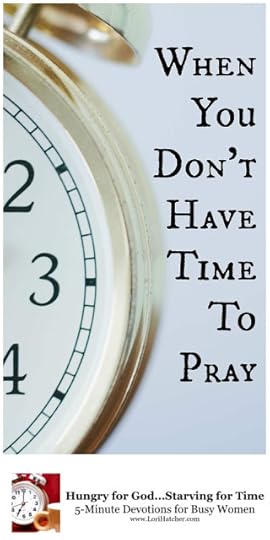
If this post was meaningful to you, would you consider sharing it with a friend by clicking on one of the buttons below? Did you know you can receive bi-weekly Hungry for God posts sent directly to your email inbox? Visit http://www.lori-benotweary.blogspot.com and click on the link in the right hand corner to Subscribe Via Email.
Copyright 2018 by Lori Hatcher
Published on August 14, 2019 17:15
August 11, 2019
Sad or Satiated? Hope When This World Gets You Down
 Think about the last time you were hungry. Not just hungry around the edges. Not, Is that my stomach gurgling? Maybe I should eat something hungry, but really hungry.
Think about the last time you were hungry. Not just hungry around the edges. Not, Is that my stomach gurgling? Maybe I should eat something hungry, but really hungry.Really, really hungry. Like, my hands are shaky, my head hurts, I think I might faint, and my stomach feels like I’ve swallowed a piranha and it’s gnawing its way out hungry.
In God’s mercy, hunger like this has never been a regular part of my life. But there have been times when I’ve been so distracted by the ache of my empty stomach that I could think of nothing else. Genuine hunger is all consuming.
As Christians, we experience a different type of hunger. This hunger manifests itself in different ways.
It’s the ache in our souls when we see those we love running from Jesus straight into the arms of Satan.
It’s the knife blade to our hearts when we see our beloved country signing legislation dooming tiny babies to death in their mother’s wombs.
It’s the howling hole in our being that weeps over those following the siren song of materialism, success, and power instead of sacrifice, service, and humility.
It’s the red-hot pulse of anger as we watch loved ones battle cancer and children die of disease.
It’s the feeble whimper that longs for mercy, grace, and kindness in a world of anger, vengeance, and cruelty.
C.S. Lewis, in Mere Christianity explained it this way:
“If I find in myself a desire which no experience in this world can satisfy, the most probable explanation is that I was made for another world.”
Jeremiah 31:25 describes a dream the prophet had of days to come. God said, “For I have satiated the weary soul, and I have replenished every sorrowful soul."
Satiated the weary soul.
The word satiate (SAY-she-ate) means to fill to the top, to satisfy with abundance. Referring to liquid, it means to drink to the full.
 When we’re satiated, we have no room for anything else. Not an ounce, a drop, or a smidgen. Think Thanksgiving-dinner-until-you-almost-burst kind of full.
When we’re satiated, we have no room for anything else. Not an ounce, a drop, or a smidgen. Think Thanksgiving-dinner-until-you-almost-burst kind of full. This is how God promises to satisfy our weary souls—filled to the top with His goodness and joy and no room for anything else. No sorrow. No tears. No longing. No fears. No hurt. No anger. No regrets.
We’ll no longer grieve for prodigal children or weep over aborted babies. Anger will no longer consume us because of disease and death. We will cease to mourn our country’s moral failures and its departure from all that is good.
God will satiate our weary souls and make everything right again. Even so, come quickly, Lord Jesus.
If your soul is weary, and your heart hurting, take comfort in this today.
 Are you hungry for God, but starving for time?
Are you hungry for God, but starving for time? I’d love to send you a 5-minute e-mail devotion twice a week to start your day off with the Lord.
Sign up for a free subscription to Hungry for God by CLICKING HERE.
Then, be sure to VALIDATE the confirmation email you receive.
Note: I promise never to spam you or share your email address.
Because busy women need to connect with God in the craziness of everyday life.

If this post was meaningful to you, would you consider sharing it with a friend by clicking on one of the buttons below? Did you know you can receive bi-weekly Hungry for God posts sent directly to your email inbox? Visit http://www.lori-benotweary.blogspot.com and click on the link in the right hand corner to Subscribe Via Email.
Copyright 2018 by Lori Hatcher
Published on August 11, 2019 17:17
August 7, 2019
How to Pray Over Your Kids without Losing Sleep
Today I'm delighted to welcome my friend Sue Schlesman to Hungry for God. Sue and I roomed together one year at the Asheville Christian Writers conference. As is always the case when I share living quarters with someone I've never met before, I felt a little anxious.
But I shouldn't have feared. The friend who connected us knew us well. Sue and I quickly discovered many points of commonality -- we're both pastor's wives and mothers of young adults. We passionately love God and the Word. We've shared a parallel journey exploring the mysteries and magnificence of prayer. I know you'll enjoy Sue's tips on how to pray for your children. If her words bless you, leave her a sweet comment to encourage her.
How to Pray Over Your Children without Losing Sleep
Ha! Tricked you.
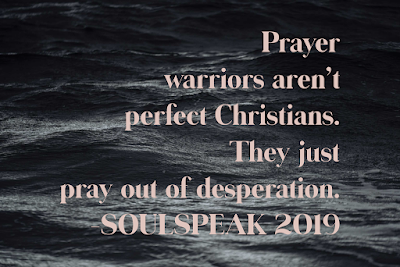 When you're freaking about kids' heartaches, you will lose sleep. When you're worried about their choices or their self-esteem, you will lose sleep. If you struggle over what to say, how much to say, when to say nothing (that's the hardest)--you will lose sleep.
When you're freaking about kids' heartaches, you will lose sleep. When you're worried about their choices or their self-esteem, you will lose sleep. If you struggle over what to say, how much to say, when to say nothing (that's the hardest)--you will lose sleep.
But you can still pray. In fact, sometimes it's the only thing you can do. It's one of the few good reasons to be tired.
I've been waiting for the age when I won't lie awake in the middle of the night thinking through all my kids' relationships, schooling, career struggles, spiritual growth, and developing habits without having anxiety. I think the answer is never.
Yeah, I know all about Ambien and Lunesta and Sleepy-Time tea. (Although I love Melatonin.) They may work for you. Not so much for me.
I'm talking about more than knocking myself out for a nice 7 hours every night. I'm talking about seeing my kids' lives from 30,000 feet and wishing they could have the same vantage point.
And I'll be honest--I'd like to sleep, too. But I've found that my best prayers are often at night. I made it a practice years ago that if I couldn't sleep, I would start praying. I'd get in some good convo with God, and then I'd get sleepy and conk out.
That's a win/win for me, since I need to do both.
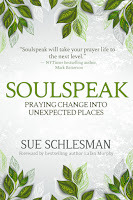 In fact, I lost so much sleep worrying and praying that I wrote a book about how to pray from a place of worship. It’s called Soul Speak, Praying Change into Unexpected Places, and is available on pre-order right now, for release on August 30. You can order it here.
In fact, I lost so much sleep worrying and praying that I wrote a book about how to pray from a place of worship. It’s called Soul Speak, Praying Change into Unexpected Places, and is available on pre-order right now, for release on August 30. You can order it here.
If you're having trouble knowing how to pray for your kids, here are a couple of quick suggestions for Scriptural prayers:
1. Pray something out of the Bible. When praying for your kids, try turning these passages into prayers: Deuteronomy 6:1-9, Joshua 1:5-9, Psalm 1, Psalm 119, Psalm 139, Proverbs 31, Colossians 1:3-14, Matthew 5:3-16, or Romans 12. (Really, all the Psalms are great prayers!)
2. Write your prayers in a journal.
3. Write letters or texts to your kids and pray in the letter.
4. Pray with them, over them, and next to them while they're sleeping.
5. Let them know you're praying for them, especially whenever they pop into your mind. That's the Holy Spirit telling you to pray for them!
I have another blog, 7prayersthatwork.com, which has a lot of prayers for parents.
Happy praying and happy sleeping!
Mark Batterson, in Praying Circles Around Your Children said: “You'll never be a perfect parent, but you can be a praying parent.”
And, “One of the greatest responsibilities of parenthood is praying for your kids, but an even greater responsibility is teaching your kids to pray. Don't just pray for them; pray with them.”
I'd love to hear how and when you pray for your children.
 Sue Schlesman is a Christian author, blogger, teacher, and speaker from Richmond, VA. She writes about life, education, family, and Jesus at www.susanwalleyschlesman.com. Her new book,
Soul Speak, Praying Change into Unexpected Places
, is on sale for HALF PRICE through August 30 and available for preorder now.
Sue Schlesman is a Christian author, blogger, teacher, and speaker from Richmond, VA. She writes about life, education, family, and Jesus at www.susanwalleyschlesman.com. Her new book,
Soul Speak, Praying Change into Unexpected Places
, is on sale for HALF PRICE through August 30 and available for preorder now.
 Are you hungry for God, but starving for time?
Are you hungry for God, but starving for time?
I’d love to send you a 5-minute e-mail devotion twice a week to start your day off with the Lord.
Sign up for a free subscription to Hungry for God by CLICKING HERE.
Then, be sure to VALIDATE the confirmation email you receive.
Note: I promise never to spam you or share your email address.
Because busy women need to connect with God in the craziness of everyday life.
If this post was meaningful to you, would you consider sharing it with a friend by clicking on one of the buttons below? Did you know you can receive bi-weekly Hungry for God posts sent directly to your email inbox? Visit http://www.lori-benotweary.blogspot.com and click on the link in the right hand corner to Subscribe Via Email.
Copyright 2018 by Lori Hatcher
But I shouldn't have feared. The friend who connected us knew us well. Sue and I quickly discovered many points of commonality -- we're both pastor's wives and mothers of young adults. We passionately love God and the Word. We've shared a parallel journey exploring the mysteries and magnificence of prayer. I know you'll enjoy Sue's tips on how to pray for your children. If her words bless you, leave her a sweet comment to encourage her.
How to Pray Over Your Children without Losing Sleep
Ha! Tricked you.
 When you're freaking about kids' heartaches, you will lose sleep. When you're worried about their choices or their self-esteem, you will lose sleep. If you struggle over what to say, how much to say, when to say nothing (that's the hardest)--you will lose sleep.
When you're freaking about kids' heartaches, you will lose sleep. When you're worried about their choices or their self-esteem, you will lose sleep. If you struggle over what to say, how much to say, when to say nothing (that's the hardest)--you will lose sleep. But you can still pray. In fact, sometimes it's the only thing you can do. It's one of the few good reasons to be tired.
I've been waiting for the age when I won't lie awake in the middle of the night thinking through all my kids' relationships, schooling, career struggles, spiritual growth, and developing habits without having anxiety. I think the answer is never.
Yeah, I know all about Ambien and Lunesta and Sleepy-Time tea. (Although I love Melatonin.) They may work for you. Not so much for me.
I'm talking about more than knocking myself out for a nice 7 hours every night. I'm talking about seeing my kids' lives from 30,000 feet and wishing they could have the same vantage point.
And I'll be honest--I'd like to sleep, too. But I've found that my best prayers are often at night. I made it a practice years ago that if I couldn't sleep, I would start praying. I'd get in some good convo with God, and then I'd get sleepy and conk out.
That's a win/win for me, since I need to do both.
 In fact, I lost so much sleep worrying and praying that I wrote a book about how to pray from a place of worship. It’s called Soul Speak, Praying Change into Unexpected Places, and is available on pre-order right now, for release on August 30. You can order it here.
In fact, I lost so much sleep worrying and praying that I wrote a book about how to pray from a place of worship. It’s called Soul Speak, Praying Change into Unexpected Places, and is available on pre-order right now, for release on August 30. You can order it here. If you're having trouble knowing how to pray for your kids, here are a couple of quick suggestions for Scriptural prayers:
1. Pray something out of the Bible. When praying for your kids, try turning these passages into prayers: Deuteronomy 6:1-9, Joshua 1:5-9, Psalm 1, Psalm 119, Psalm 139, Proverbs 31, Colossians 1:3-14, Matthew 5:3-16, or Romans 12. (Really, all the Psalms are great prayers!)
2. Write your prayers in a journal.
3. Write letters or texts to your kids and pray in the letter.
4. Pray with them, over them, and next to them while they're sleeping.
5. Let them know you're praying for them, especially whenever they pop into your mind. That's the Holy Spirit telling you to pray for them!
I have another blog, 7prayersthatwork.com, which has a lot of prayers for parents.
Happy praying and happy sleeping!
Mark Batterson, in Praying Circles Around Your Children said: “You'll never be a perfect parent, but you can be a praying parent.”
And, “One of the greatest responsibilities of parenthood is praying for your kids, but an even greater responsibility is teaching your kids to pray. Don't just pray for them; pray with them.”
I'd love to hear how and when you pray for your children.
 Sue Schlesman is a Christian author, blogger, teacher, and speaker from Richmond, VA. She writes about life, education, family, and Jesus at www.susanwalleyschlesman.com. Her new book,
Soul Speak, Praying Change into Unexpected Places
, is on sale for HALF PRICE through August 30 and available for preorder now.
Sue Schlesman is a Christian author, blogger, teacher, and speaker from Richmond, VA. She writes about life, education, family, and Jesus at www.susanwalleyschlesman.com. Her new book,
Soul Speak, Praying Change into Unexpected Places
, is on sale for HALF PRICE through August 30 and available for preorder now. Are you hungry for God, but starving for time?
Are you hungry for God, but starving for time? I’d love to send you a 5-minute e-mail devotion twice a week to start your day off with the Lord.
Sign up for a free subscription to Hungry for God by CLICKING HERE.
Then, be sure to VALIDATE the confirmation email you receive.
Note: I promise never to spam you or share your email address.
Because busy women need to connect with God in the craziness of everyday life.
If this post was meaningful to you, would you consider sharing it with a friend by clicking on one of the buttons below? Did you know you can receive bi-weekly Hungry for God posts sent directly to your email inbox? Visit http://www.lori-benotweary.blogspot.com and click on the link in the right hand corner to Subscribe Via Email.
Copyright 2018 by Lori Hatcher
Published on August 07, 2019 17:12
August 4, 2019
Looking for God?
 For 28 days, my friend Don was on a treasure hunt.
For 28 days, my friend Don was on a treasure hunt. Wherever he went, he looked for dropped coins. He found them, too. Every day for almost a month. Pennies mostly, but every now and then he spotted a nickel or a quarter.
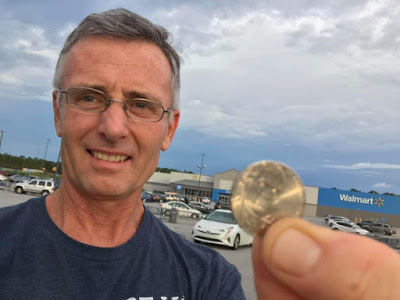 “I don't hunt for money,” Don said in one of his Facebook posts, “but I make the most of every opportunity to find it. I scan the parking lot as walk into a store, look on the ground by the cash registers, and run through drive thrus when I go out for runs if they are on my route. Sometimes I make sure that they are.”
“I don't hunt for money,” Don said in one of his Facebook posts, “but I make the most of every opportunity to find it. I scan the parking lot as walk into a store, look on the ground by the cash registers, and run through drive thrus when I go out for runs if they are on my route. Sometimes I make sure that they are.” Don’s commitment to walk through his days with his eyes open reminded me of a story my pastor told years ago. On the way to visit a church member who’d just been diagnosed with terminal cancer, he prayed for words to encourage her. By the time he arrived, he knew what the Lord wanted him to say.
“Every day,” he challenged the woman, “look for evidences of God’s presence. Don’t stop looking until you find them.”
She did, and God revealed Himself to her in sweet and profound ways.
I wonder what we’d see if we approached each day looking for God.
One morning I decided to try it.
In the cool of the breeze, I witnessed God’s restorative and refreshing presence.
In the pink dawn, I saw how his mercies are new every morning.
In the frolicking kittens on my neighbor’s lawn, I glimpsed his free-spirited creativity.
In the abundant rain, I peeked into his bountiful heart.
In the neighbor’s wave, I spied his Father’s heart longing to reconcile his children.
Everywhere I turned, God was there.
Today, if you need proof that God is alive, active, and all around you, look around. Like Don, make the most of every opportunity to find Him. Scan the horizon. Look high and look low. Don’t stop until you spot Him.

Don’s coin hunting streak ended at 10:52 pm on Day 28. He hunted all that day with no success. Thankfully, we’ll never have this problem with God.
The prophet Jeremiah promised: "You will seek me and find me when you seek me with all your heart" (Jeremiah 29:13).
If we look intentionally, we’ll see Him. Aren’t you glad?
Now it’s your turn. How have you seen God at work around you today? Leave a comment below and share your thoughts. If you’re reading by email, CLICK HERE to visit Hungry for God online and leave a comment.
 Are you hungry for God, but starving for time?
Are you hungry for God, but starving for time? I’d love to send you a 5-minute e-mail devotion twice a week to start your day off with the Lord.
Sign up for a free subscription to Hungry for God by CLICKING HERE.
Then, be sure to VALIDATE the confirmation email you receive.
Note: I promise never to spam you or share your email address.
Because busy women need to connect with God in the craziness of everyday life.

If this post was meaningful to you, would you consider sharing it with a friend by clicking on one of the buttons below? Did you know you can receive bi-weekly Hungry for God posts sent directly to your email inbox? Visit http://www.lori-benotweary.blogspot.com and click on the link in the right hand corner to Subscribe Via Email.
Copyright 2018 by Lori Hatcher
Published on August 04, 2019 16:45
July 28, 2019
Now I See Clearly -- A Guest Post by Shelley Pierce
Today it's my pleasure to welcome a new friend to Hungry for God ... Starving for Time. I met Shelley Pierce at the Blue Ridge Mountains Christian Writers Conference. She's a pastor's wife, author, and doting grandma. Please leave her a kind word in the comments today to welcome her.

Now I See Clearly
As a blessed empty nester, I’m happy to announce—I finally have my own bathroom! I no longer have to wait my turn for a shower, and no one gets into my make-up.
It was an exciting day when I realized the last Pierce child was married and total control belonged to me.
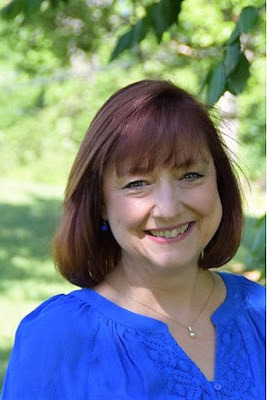
I polished the counter top. I bought new towels. I arranged two cute little baskets to the left of the sink that could neatly hold my cosmetics. I lined up my hairbrushes and curling iron to the right. Then I stood back and smiled as I turned on my Scentsy and dropped in a few lavender scented wax cubes.
Life as an empty nester with my own organized bathroom counter tops was good.
For a while, life went on as usual. Work. Grandma time. Writing.
Lather.
Rinse.
Repeat.
Then one day, my husband stepped into my “Necessary Room.”
“Wow, how can you even see in here?”
“What’s the problem? I see just fine.”
“Half of your vanity lights are out,” he said.
I shrugged and scurried off to work without another thought of my low-lit mirror.
That evening I began my nightly attempt at beauty control and flipped on the light.
Oh. My.
My sweet husband had replaced the burned out bulbs while I was away. Now I could see what I’d been missing:
Laugh lines and spots.
Wrinkles and puffs.
And my sparkly clean counter top? Speckled with toothpaste and make up.
Oh. My.
Those sneaky round bulbs had burned out slowly and strategically. One by one. So slowly, in fact, I hadn’t even noticed my world had gotten dimmer.
I hadn’t noticed a line here and a crease there on my empty nester face. Oh, and my neck. Let’s not even talk about my neck.
The next morning I faced the well-lit mirror again. It was still quite shocking.
As I drove to work that day, I thought about the woman in the mirror. So many changes in such a short amount of time.

Then God whispered in my unsuspecting ear.“You’re just like your bathroom.”
“Excuse me? What?”
“Yes. You are. You see, just like you didn’t notice the lights that burned out one by one, you also don’t seem to notice how often you start your day without me.”
My heart sank at the truth of His words.
“Without time with me, you cannot see clearly. You think everything is just fine. But it is not.”
Tears pooled in the corners of my eyes.
“Without time with me, you misunderstand others. You have thoughts you shouldn’t. You don’t talk about me with your friends. You forget me.”
Remorse filled my heart.
“I’m sorry, Lord. I’m so sorry.”
“I love you and long for time with you. Sit with me awhile.”
Realizing my pitiful condition reminded me of 1 John 1:5-7 and the importance of walking in His light. Can I honestly say I have fellowship with God if I choose the darkness of busyness over the light of spending time in his truth?
I opened my Bible to the passage and read the familiar words again. "God is light, and there is absolutely no darkness in Him. If we say we have fellowship with Him, and walk in darkness, we are lying and we are not practicing the truth. But if we walk in the light as He Himself is in the light, we have fellowship with one another, and the blood of Jesus Hus Son cleanses us from all sin" (HCSB).
Conviction ran through me as I faced the truth of my early morning choices in recent weeks. Choosing to tackle the list of “things to do” instead of making fellowship with my Jesus a priority had taken its toll.
In view of God’s revealing words to me, I’ve been quite tempted to reach up and give a few of those truth-telling bulbs a twist to hush them up.
But you know what? I think I’ll leave them alone. I’ll face the truth each morning. I’ll not hide from the creases and lines they reveal.
As they show me what’s on the outside, I’ll also let them remind me of what’s most important—the Truth that tells me to “Come. Sit awhile with me.”
Thank you, Lord, for showing me the disarray of my heart when I neglect my time with you.
Now, where did I put that Crepe Erase?
 Shelley is a Director of Preschool and Children’s Ministries and a grandma. She’s the author of The Crumberry Chronicles, a middle grade speculative fiction series which includes
The Wish I Wished Last Night
and Battle Buddies. Shelley’s first nonfiction book, Sweet Moments, Insight and Encouragement for the Pastor’s Wife, released March 2019. Her first children’s picture book, I Know What Grandma Does While I’m Napping, released June, 2019. Shelley’s work in progress is Volume 3 in the Crumberry series.
Shelley is a Director of Preschool and Children’s Ministries and a grandma. She’s the author of The Crumberry Chronicles, a middle grade speculative fiction series which includes
The Wish I Wished Last Night
and Battle Buddies. Shelley’s first nonfiction book, Sweet Moments, Insight and Encouragement for the Pastor’s Wife, released March 2019. Her first children’s picture book, I Know What Grandma Does While I’m Napping, released June, 2019. Shelley’s work in progress is Volume 3 in the Crumberry series.
 Are you hungry for God, but starving for time?
Are you hungry for God, but starving for time?
I’d love to send you a 5-minute e-mail devotion twice a week to start your day off with the Lord.
Sign up for a free subscription to Hungry for God by CLICKING HERE.
Then, be sure to VALIDATE the confirmation email you receive.
Note: I promise never to spam you or share your email address.
Because busy women need to connect with God in the craziness of everyday life.

If this post was meaningful to you, would you consider sharing it with a friend by clicking on one of the buttons below? Did you know you can receive bi-weekly Hungry for God posts sent directly to your email inbox? Visit http://www.lori-benotweary.blogspot.com and click on the link in the right hand corner to Subscribe Via Email.
Copyright 2018 by Lori Hatcher

Now I See Clearly
As a blessed empty nester, I’m happy to announce—I finally have my own bathroom! I no longer have to wait my turn for a shower, and no one gets into my make-up.
It was an exciting day when I realized the last Pierce child was married and total control belonged to me.

I polished the counter top. I bought new towels. I arranged two cute little baskets to the left of the sink that could neatly hold my cosmetics. I lined up my hairbrushes and curling iron to the right. Then I stood back and smiled as I turned on my Scentsy and dropped in a few lavender scented wax cubes.
Life as an empty nester with my own organized bathroom counter tops was good.
For a while, life went on as usual. Work. Grandma time. Writing.
Lather.
Rinse.
Repeat.
Then one day, my husband stepped into my “Necessary Room.”
“Wow, how can you even see in here?”
“What’s the problem? I see just fine.”
“Half of your vanity lights are out,” he said.
I shrugged and scurried off to work without another thought of my low-lit mirror.
That evening I began my nightly attempt at beauty control and flipped on the light.
Oh. My.
My sweet husband had replaced the burned out bulbs while I was away. Now I could see what I’d been missing:
Laugh lines and spots.
Wrinkles and puffs.
And my sparkly clean counter top? Speckled with toothpaste and make up.
Oh. My.
Those sneaky round bulbs had burned out slowly and strategically. One by one. So slowly, in fact, I hadn’t even noticed my world had gotten dimmer.
I hadn’t noticed a line here and a crease there on my empty nester face. Oh, and my neck. Let’s not even talk about my neck.
The next morning I faced the well-lit mirror again. It was still quite shocking.
As I drove to work that day, I thought about the woman in the mirror. So many changes in such a short amount of time.

Then God whispered in my unsuspecting ear.“You’re just like your bathroom.”
“Excuse me? What?”
“Yes. You are. You see, just like you didn’t notice the lights that burned out one by one, you also don’t seem to notice how often you start your day without me.”
My heart sank at the truth of His words.
“Without time with me, you cannot see clearly. You think everything is just fine. But it is not.”
Tears pooled in the corners of my eyes.
“Without time with me, you misunderstand others. You have thoughts you shouldn’t. You don’t talk about me with your friends. You forget me.”
Remorse filled my heart.
“I’m sorry, Lord. I’m so sorry.”
“I love you and long for time with you. Sit with me awhile.”
Realizing my pitiful condition reminded me of 1 John 1:5-7 and the importance of walking in His light. Can I honestly say I have fellowship with God if I choose the darkness of busyness over the light of spending time in his truth?
I opened my Bible to the passage and read the familiar words again. "God is light, and there is absolutely no darkness in Him. If we say we have fellowship with Him, and walk in darkness, we are lying and we are not practicing the truth. But if we walk in the light as He Himself is in the light, we have fellowship with one another, and the blood of Jesus Hus Son cleanses us from all sin" (HCSB).
Conviction ran through me as I faced the truth of my early morning choices in recent weeks. Choosing to tackle the list of “things to do” instead of making fellowship with my Jesus a priority had taken its toll.
In view of God’s revealing words to me, I’ve been quite tempted to reach up and give a few of those truth-telling bulbs a twist to hush them up.
But you know what? I think I’ll leave them alone. I’ll face the truth each morning. I’ll not hide from the creases and lines they reveal.
As they show me what’s on the outside, I’ll also let them remind me of what’s most important—the Truth that tells me to “Come. Sit awhile with me.”
Thank you, Lord, for showing me the disarray of my heart when I neglect my time with you.
Now, where did I put that Crepe Erase?
 Shelley is a Director of Preschool and Children’s Ministries and a grandma. She’s the author of The Crumberry Chronicles, a middle grade speculative fiction series which includes
The Wish I Wished Last Night
and Battle Buddies. Shelley’s first nonfiction book, Sweet Moments, Insight and Encouragement for the Pastor’s Wife, released March 2019. Her first children’s picture book, I Know What Grandma Does While I’m Napping, released June, 2019. Shelley’s work in progress is Volume 3 in the Crumberry series.
Shelley is a Director of Preschool and Children’s Ministries and a grandma. She’s the author of The Crumberry Chronicles, a middle grade speculative fiction series which includes
The Wish I Wished Last Night
and Battle Buddies. Shelley’s first nonfiction book, Sweet Moments, Insight and Encouragement for the Pastor’s Wife, released March 2019. Her first children’s picture book, I Know What Grandma Does While I’m Napping, released June, 2019. Shelley’s work in progress is Volume 3 in the Crumberry series. Are you hungry for God, but starving for time?
Are you hungry for God, but starving for time? I’d love to send you a 5-minute e-mail devotion twice a week to start your day off with the Lord.
Sign up for a free subscription to Hungry for God by CLICKING HERE.
Then, be sure to VALIDATE the confirmation email you receive.
Note: I promise never to spam you or share your email address.
Because busy women need to connect with God in the craziness of everyday life.

If this post was meaningful to you, would you consider sharing it with a friend by clicking on one of the buttons below? Did you know you can receive bi-weekly Hungry for God posts sent directly to your email inbox? Visit http://www.lori-benotweary.blogspot.com and click on the link in the right hand corner to Subscribe Via Email.
Copyright 2018 by Lori Hatcher
Published on July 28, 2019 17:32
July 24, 2019
Relief When You're Melting In Life's Heat
 If you’ve ever cared for young children, you know how hard it is to keep them occupied indoors.
If you’ve ever cared for young children, you know how hard it is to keep them occupied indoors. And while the moderate climate of my home state of South Carolina provides year-round opportunities to play outside, my grandchildren and I struggle in June, July, and August. Mid-day temperatures often reach 100 degrees, hot enough to melt even the most resilient outdoor lover.
Such was our quandary one Fun Friday at Gigi’s house. We’d exhausted our indoor options and the children begged to go outside. The new box of sidewalk chalk was singing a siren’s song to their creative souls.
“Please can we go outside, Gigi?” Lauren said. “It’s not too hot.”
The thermometer said otherwise, but I agreed. They’ll realize I was right, I thought, and scurry back inside asking for Popsicles. To my surprise, however, they lingered long over their chalk drawings, embellishing my sidewalk with a rainbow of colors and shapes.
But even children aren’t oblivious to the effects of unrelenting sunshine. Their cheeks turned crimson. Bright beads of sweat appeared on their foreheads and upper lips. Damp strands of hair curled into corkscrews at their hairlines. Grabbing pink, purple, and blue Popsicles from the freezer, I headed outside, only to stop in surprise.
Where they had been scattered apart, staking their claims on the wide open canvas of the driveway, now they huddled in a tight knot at the foot of the stairs.
“Look, Gigi,” Lauren said proudly. “We found shade.”
And sure enough, they had. Clustered in the only shady spot on the sidewalk, they crouched happily, drawing loopy loop daisies and flower bouquets.
Shade, either from a tree, an awning, or a building can make the temperature feel ten to fifteen degrees cooler, experts tell us. And when you’re trying to enjoy the outside, there’s a huge difference between 85 and 100. But the relief, shelter, and protection shade offers doesn’t just make a person feel better. It can make the difference between life and death, as heat stroke occurs most often when working or playing in direct sunlight.
How marvelous that God our Father calls himself our shade. "The LORD is your keeper,” the psalmist writes. “The LORD is your shade on your right hand” (Psalm 121:5).
Instead of shielding us from the effects of heat and sunshine, however, God provides a welcome respite from the incinerating power of life’s challenges.
“He who dwells in the shelter of the Most High,” Psalm 91:1 reminds us, “will rest in the shadow of the Almighty.”
Today, if you’re melting under the heat of adversity, sweating from the relentless effects of trials, or fainting from the fiery blast of sickness, I invite you to seek relief in the shadow of God’s wings.
Huddle close in prayer. Gather with others searching for shelter. Praise Him for His presence and His Promises. Exult in His care for you.
Say with the psalmist, “Because You have been my help, Therefore in the shadow of Your wings I will rejoice” (Psalm 63:7).
If you’re struggling today, I pray you’ll allow God to cast his big, broad shadow over your feeble soul and give you relief.
 Are you hungry for God, but starving for time?
Are you hungry for God, but starving for time? I’d love to send you a 5-minute e-mail devotion twice a week to start your day off with the Lord.
Sign up for a free subscription to Hungry for God by CLICKING HERE.
Then, be sure to VALIDATE the confirmation email you receive.
Note: I promise never to spam you or share your email address.
Because busy women need to connect with God in the craziness of everyday life.

 Are you hungry for God, but starving for time?
Are you hungry for God, but starving for time? I’d love to send you a 5-minute e-mail devotion twice a week to start your day off with the Lord.
Sign up for a free subscription to Hungry for God by CLICKING HERE.
Then, be sure to VALIDATE the confirmation email you receive.
Note: I promise never to spam you or share your email address.
Because busy women need to connect with God in the craziness of everyday life.
If this post was meaningful to you, would you consider sharing it with a friend by clicking on one of the buttons below? Did you know you can receive bi-weekly Hungry for God posts sent directly to your email inbox? Visit http://www.lori-benotweary.blogspot.com and click on the link in the right hand corner to Subscribe Via Email.
Copyright 2018 by Lori Hatcher
Published on July 24, 2019 17:32
July 17, 2019
Haircuts and Holiness -- How Patient Endurance Makes Them Possible
I remember the first time I saw my mother-in-law giving my soon-to-be husband a haircut.
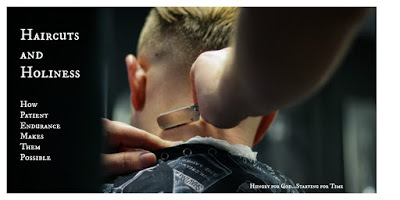 “I didn’t know you were a beautician,” I said, surprised to see her wielding her scissors like a pro.
“I didn’t know you were a beautician,” I said, surprised to see her wielding her scissors like a pro.
“I’m not, but I’ve learned a few things over the years.” She then demonstrated how to give a haircut. “When y’all get married,” she said, “you can cut David’s hair.”
Whaaaaaat?
In my family, haircuts were off-limits to amateurs. Only someone with a certificate and a special chair touched our heads. And if they didn’t have a jar of assorted combs soaking in green liquid on their counter top, uh uh, ain’t no way they were lifting a pair of scissors to our locks.
That’s why I knew David’s mother was joking—until our bridal shower.
After opening a dozen boxes containing cookware, Corning Wear, and underwear (yeah, someone got confused and thought it was a lingerie shower), I peeled the paper off a small, flat package. The box inside said, Professional Hair Cutting Set.
“Now you won’t have to borrow my tools,” my almost-mother-in-law said with a smile.
Oh my, I thought. She honestly thinks I’m going to give David a haircut.
I carried the gifts home and tucked the hair cutting kit in the bottom of a box. There it lay, forgotten, until about a month after our wedding.
“Lori,” my new husband said, “my hair’s getting a little shaggy. Would you give me a haircut?”
“Are you serious?” I practically screeched. “The only hair I’ve ever cut was my Barbie’s, and that didn’t turn out so well. I can’t cut your hair. People go to school for years to learn how. What if I make a mistake? There’s no gluing it back on, you know. Remember that school picture from kindergarten when your sister took a pair of scissors to your bangs? Do you really want to go back there?”
But there was no convincing him. His mom always cut his hair, and when I signed the marriage certificate, she passed the mantle to me. The thought of going to a stranger for a haircut was foreign and distasteful.
“Think about how much money we’ll save,” he reasoned. “I trust you. You can do this.”
And so I did.
Keep in mind that these were the days before YouTube. My best hope was to check out a book from the library, study the instructions, and give it my best shot.
Some haircuts came out fairly decent. Others not so much.
I had the hardest time figuring out how to keep David’s hair from falling straight down like Mo on the Three Stooges. Several times, as I cut along the neckline and around the ears, I cut a little high, leaving him with whitewalls of scalp that hadn’t seen the sunshine in years. Other times I failed to compensate for the cowlick at his crown, giving him a haircut that would have made Alfalfa proud.
Through it all, my husband was patient, gracious, and encouraging. “You’ll figure it out. You’re doing a great job.”
Thankfully, most of my mistakes were in the back, where he couldn’t see them. But I could.
Every time I looked at one of those botched haircuts, I cringed. I had made the mistake, but he was wearing it.
It occurred to me recently that sometimes, in marriage, we wear each other’s shame in other ways.
 A husband’s poor social skills embarrass his wife at a work event. A wife’s tinder-box temper erupts at the neighborhood pool, causing her husband to squirm as heads turn. A person’s impatience, coarse language, or ignorance reflect on their spouses too, because, for better or for worse, they are a couple.
A husband’s poor social skills embarrass his wife at a work event. A wife’s tinder-box temper erupts at the neighborhood pool, causing her husband to squirm as heads turn. A person’s impatience, coarse language, or ignorance reflect on their spouses too, because, for better or for worse, they are a couple.
After almost 35 years of marriage, I like to think of myself as mature, self-controlled, and patient. But one afternoon, like the choppy haircuts of our early years, my husband had to wear the results of my less-than stellar behavior.
It had been a long day. A thunderstorm had awakened us at 4:30 in the morning, disturbing our sleep and leaving us without electricity. We’d stuck it out in the house until the heat became unbearable, then we sought refuge at our daughter’s home.
Grateful we’d made plans to eat out with friends for dinner, we were finishing up our meal when a text from a neighbor lit up my phone. Hooray! The power’s back on.
After being a vagabond for most of the day, I was ready to go home. But my husband had one more story to tell. I patted him on the leg, our signal for I’m ready to go. He finished the story, then launched into another one. I nudged him with my elbow. He still didn’t get the message, so I nudged him again. Less gently this time.
My impatient rudeness was obvious by that point, and my husband experienced the shame of it in front of our friends. Because everyone knows pastors and their wives never fight, right? At least not in public.
My prideful self tried to justify my actions by mentally listing the things my husband has done that have embarrassed me, but the Holy Spirit wouldn’t let me rest. I apologized, remorseful about how I’d treated him and ashamed that others had witnessed my poor behavior.
Later, the Holy Spirit consoled me with the truth—we’re all works in progress.
In progress.
If we’re believers, the Spirit of God lives in us, gradually conforming us to Christ’s image. But the work takes time. Our path to holiness climbs upward, but isn’t immune to detours and backslides. When those around us behave in less than stellar ways, and we respond with grace, we take a giant step along our own path of Christ-likeness.
First Corinthians 13:7 reminds us love “bears all things, believes all things, hopes all things, endures all things.”
While there are limits to bearing and enduring—no one should remain in a dangerous, abusive relationship, most of us come nowhere near this scenario. The worst we experience are small annoyances that fall short of perfection or cause us embarrassment.
I’m so grateful for Christ, who’s the epitome of patience and kindness. His example challenges me not only to be patient with myself when I act in less-than-godly ways, but to be grateful for my husband, who faithfully bears with me through my spiritual growing pains.
Someday, I pray, he’ll wear my behavior (like my haircuts) with pride, knowing that his longsuffering commitment to my growth in holiness helped make it possible.
Now it's your turn. Who has God used in your life to encourage you in the paths of holiness? Leave a comment below and share your story. If you're reading by email, CLICK HERE to visit Hungry for God online and leave a comment.
 Are you hungry for God, but starving for time?
Are you hungry for God, but starving for time?
I’d love to send you a 5-minute e-mail devotion twice a week to start your day off with the Lord.
Sign up for a free subscription to Hungry for God by CLICKING HERE.
Then, be sure to VALIDATE the confirmation email you receive.
Note: I promise never to spam you or share your email address.
Because busy women need to connect with God in the craziness of everyday life.

If this post was meaningful to you, would you consider sharing it with a friend by clicking on one of the buttons below? Did you know you can receive bi-weekly Hungry for God posts sent directly to your email inbox? Visit http://www.lori-benotweary.blogspot.com and click on the link in the right hand corner to Subscribe Via Email.
Copyright 2018 by Lori Hatcher
 “I didn’t know you were a beautician,” I said, surprised to see her wielding her scissors like a pro.
“I didn’t know you were a beautician,” I said, surprised to see her wielding her scissors like a pro. “I’m not, but I’ve learned a few things over the years.” She then demonstrated how to give a haircut. “When y’all get married,” she said, “you can cut David’s hair.”
Whaaaaaat?
In my family, haircuts were off-limits to amateurs. Only someone with a certificate and a special chair touched our heads. And if they didn’t have a jar of assorted combs soaking in green liquid on their counter top, uh uh, ain’t no way they were lifting a pair of scissors to our locks.
That’s why I knew David’s mother was joking—until our bridal shower.
After opening a dozen boxes containing cookware, Corning Wear, and underwear (yeah, someone got confused and thought it was a lingerie shower), I peeled the paper off a small, flat package. The box inside said, Professional Hair Cutting Set.
“Now you won’t have to borrow my tools,” my almost-mother-in-law said with a smile.
Oh my, I thought. She honestly thinks I’m going to give David a haircut.
I carried the gifts home and tucked the hair cutting kit in the bottom of a box. There it lay, forgotten, until about a month after our wedding.
“Lori,” my new husband said, “my hair’s getting a little shaggy. Would you give me a haircut?”
“Are you serious?” I practically screeched. “The only hair I’ve ever cut was my Barbie’s, and that didn’t turn out so well. I can’t cut your hair. People go to school for years to learn how. What if I make a mistake? There’s no gluing it back on, you know. Remember that school picture from kindergarten when your sister took a pair of scissors to your bangs? Do you really want to go back there?”
But there was no convincing him. His mom always cut his hair, and when I signed the marriage certificate, she passed the mantle to me. The thought of going to a stranger for a haircut was foreign and distasteful.
“Think about how much money we’ll save,” he reasoned. “I trust you. You can do this.”
And so I did.
Keep in mind that these were the days before YouTube. My best hope was to check out a book from the library, study the instructions, and give it my best shot.
Some haircuts came out fairly decent. Others not so much.
I had the hardest time figuring out how to keep David’s hair from falling straight down like Mo on the Three Stooges. Several times, as I cut along the neckline and around the ears, I cut a little high, leaving him with whitewalls of scalp that hadn’t seen the sunshine in years. Other times I failed to compensate for the cowlick at his crown, giving him a haircut that would have made Alfalfa proud.
Through it all, my husband was patient, gracious, and encouraging. “You’ll figure it out. You’re doing a great job.”
Thankfully, most of my mistakes were in the back, where he couldn’t see them. But I could.
Every time I looked at one of those botched haircuts, I cringed. I had made the mistake, but he was wearing it.
It occurred to me recently that sometimes, in marriage, we wear each other’s shame in other ways.
 A husband’s poor social skills embarrass his wife at a work event. A wife’s tinder-box temper erupts at the neighborhood pool, causing her husband to squirm as heads turn. A person’s impatience, coarse language, or ignorance reflect on their spouses too, because, for better or for worse, they are a couple.
A husband’s poor social skills embarrass his wife at a work event. A wife’s tinder-box temper erupts at the neighborhood pool, causing her husband to squirm as heads turn. A person’s impatience, coarse language, or ignorance reflect on their spouses too, because, for better or for worse, they are a couple. After almost 35 years of marriage, I like to think of myself as mature, self-controlled, and patient. But one afternoon, like the choppy haircuts of our early years, my husband had to wear the results of my less-than stellar behavior.
It had been a long day. A thunderstorm had awakened us at 4:30 in the morning, disturbing our sleep and leaving us without electricity. We’d stuck it out in the house until the heat became unbearable, then we sought refuge at our daughter’s home.
Grateful we’d made plans to eat out with friends for dinner, we were finishing up our meal when a text from a neighbor lit up my phone. Hooray! The power’s back on.
After being a vagabond for most of the day, I was ready to go home. But my husband had one more story to tell. I patted him on the leg, our signal for I’m ready to go. He finished the story, then launched into another one. I nudged him with my elbow. He still didn’t get the message, so I nudged him again. Less gently this time.
My impatient rudeness was obvious by that point, and my husband experienced the shame of it in front of our friends. Because everyone knows pastors and their wives never fight, right? At least not in public.
My prideful self tried to justify my actions by mentally listing the things my husband has done that have embarrassed me, but the Holy Spirit wouldn’t let me rest. I apologized, remorseful about how I’d treated him and ashamed that others had witnessed my poor behavior.
Later, the Holy Spirit consoled me with the truth—we’re all works in progress.
In progress.
If we’re believers, the Spirit of God lives in us, gradually conforming us to Christ’s image. But the work takes time. Our path to holiness climbs upward, but isn’t immune to detours and backslides. When those around us behave in less than stellar ways, and we respond with grace, we take a giant step along our own path of Christ-likeness.
First Corinthians 13:7 reminds us love “bears all things, believes all things, hopes all things, endures all things.”
While there are limits to bearing and enduring—no one should remain in a dangerous, abusive relationship, most of us come nowhere near this scenario. The worst we experience are small annoyances that fall short of perfection or cause us embarrassment.
I’m so grateful for Christ, who’s the epitome of patience and kindness. His example challenges me not only to be patient with myself when I act in less-than-godly ways, but to be grateful for my husband, who faithfully bears with me through my spiritual growing pains.
Someday, I pray, he’ll wear my behavior (like my haircuts) with pride, knowing that his longsuffering commitment to my growth in holiness helped make it possible.
Now it's your turn. Who has God used in your life to encourage you in the paths of holiness? Leave a comment below and share your story. If you're reading by email, CLICK HERE to visit Hungry for God online and leave a comment.
 Are you hungry for God, but starving for time?
Are you hungry for God, but starving for time? I’d love to send you a 5-minute e-mail devotion twice a week to start your day off with the Lord.
Sign up for a free subscription to Hungry for God by CLICKING HERE.
Then, be sure to VALIDATE the confirmation email you receive.
Note: I promise never to spam you or share your email address.
Because busy women need to connect with God in the craziness of everyday life.

If this post was meaningful to you, would you consider sharing it with a friend by clicking on one of the buttons below? Did you know you can receive bi-weekly Hungry for God posts sent directly to your email inbox? Visit http://www.lori-benotweary.blogspot.com and click on the link in the right hand corner to Subscribe Via Email.
Copyright 2018 by Lori Hatcher
Published on July 17, 2019 17:41
Refresh Blog
A place to refresh your faith, hope, and prayers with 5-minute weekly posts.
- Lori Hatcher's profile
- 101 followers



